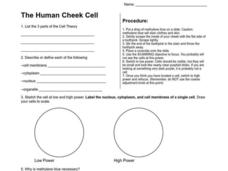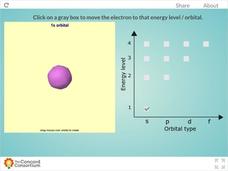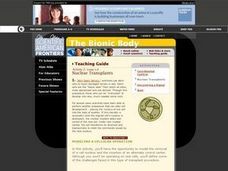Curated OER
How Do Organisms Reproduce
Students examine the difference between mitosis and meiosis, and describe the steps involved in meiosis and the significance of each step. They create a diploid nucleus containing two pairs of chromosomes using clay.
Curated OER
Cells: Living Units
In this cell worksheet, students answer 81 questions about the cell including multiple choice, fill in the blank, short answer and matching. Topics include cell structure, the cell membrane, the nucleus, cell growth and reproduction and...
Curated OER
Matching Worksheet: Life Science
In this matching worksheet, learners match fifteen words to their definition. They identify words dealing life science such as cell, cell membrane, producer, and antibodies.
Curated OER
Cells and Microscopes
In this biology worksheet, students locate and identify various vocabulary terms relating to cells and microscopes listed on the right. There are 26 biology terms located in the word search.
Curated OER
Word Search on Mitosis
In this biology worksheet, students identify and locate various vocabulary terms related to the process of mitosis. There are 19 biology terms located in the word search.
Curated OER
Module 9 Metals
In this chemistry worksheet, students identify and locate various vocabulary terms related to metals found in the periodic table. There are 54 chemistry terms located in the word search.
Curated OER
Cell Theory, Plant And Animal Cell Comparison
Tenth graders study plant and animal cells. In this investigative lesson students draw their own animal cells and label them.
Curated OER
Looking Inside Cells
Seventh graders analyze and identify the role of the cell membrane and nucleus. They create flash cards to help them review cell structures. They also compare plant and animal cells.
Curated OER
DNA and Individual Differences
Middle schoolers list differences between DNA-related terms and create a simple DNA circle map. They order terms including human body, organ, tissue, cell, nucleus, etc. from largest to smallest. They discuss differences and...
Curated OER
Comets and Meteors
Students construct a model of a comet nucleus using dry ice. They add other materials and describe the features. They complete related exercises on an Internet Web site.
Curated OER
Chemistry
In this chemistry worksheet, learners describe an atom, its parts, the charges of these parts, and atoms life functions. Then they explain what the octet rule states for the placements of electrons around the nucleus of an atom. Students...
Curated OER
The Human Cheek Cell
In this human cells worksheet, 7th graders complete a science experiment using human cheek cells. Students sketch the cells at high and lower power and label the cell nucleus, cytoplasm, and cell membrane.
Concord Consortium
Energy Levels of a Hydrogen Atom
Tired of blowing up countless balloons to illustrate orbital shapes around an atom? Give your lungs a break and use an interactive instead! Learners observe s, p, d, and f orbitals through the first four energy levels using hydrogen as a...
Curated OER
The Nucleus
In this atoms worksheet, students review terms associated with atoms which includes isotopes, transmutation, and radioactive decay. This worksheet has 11 short answer questions.
Curated OER
DNA
In this DNA worksheet, 9th graders read a brief excerpt pertaining to the genetic code and identify how proteins know which cell to create. Then they use the genetic code dictionary to draw a diagram showing the codons for an imaginary...
Curated OER
Comparing Plant and Animal Cells in a Venn Diagram
In this science graphic organizer worksheet, students fill in a Venn Diagram by comparing plant and animal cells. They use the words from the word bank to fill in each portion of the graphic organizer. They use words such as...
Curated OER
Using Microscopes
Students do an experiment using a microscope. In this lesson, about cells, students examine different slides using a microscope. Students look at an onion skin, cheek cells, and potato cells. In each of these, students find cell walls,...
Curated OER
Those Cells Look Good Enough to Eat
Students explore the parts of the cell. In this cell lesson, students use foods to create cell models that represent the nucleus, cytoplasm, cell membrane, mitochondria, ribosomes, vacuoles, endoplasmic reticulum, and Golgi bodies...
Curated OER
Clay Atoms-Taming Our Fear Of The Invisible
Students create atoms with clay by using different colors to represent the protons, neutrons and nucleus. In this creative lesson students use clay to learn about atoms and see how they apply to the periodic table.
Curated OER
Neuron Word Scramble
In this brain word scramble worksheet, students unscramble 7 sets of letters to form the words: axon, synapse, neuron, dendrite, myelin, soma, and nucleus.
Curated OER
Paper Comet Model with a Deep Impact
Students create paper comet models. They discuss facts about comets and build a model to determine the way the sun affects a comet. They create a comet and label the head and tail portions. They discuss their comet model and share it...
Curated OER
Comparing a Cell to a Factory
In this cell worksheet, students access a given website to compare the cell organelles and their functions to jobs in a factory. This worksheet is a graphic organizer.
Curated OER
Nuclear Transplants
Students model the removal of a cell nucleus and the insertion of an alternate control center. They define some of the challenges faced in this type of transplant procedure. Students discuss cloning.
Curated OER
Cells and Cancer
Students idenitfy that cancer is a growth of mutated cells and that cancer cells are only one type of cell that causes disease in our body. They also identify that all eukaryotic cells contain a nucleus, cytoskeleton, and a cell...























